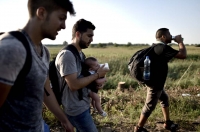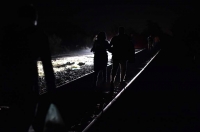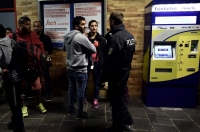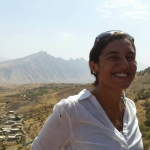Dear Adam: New Year, new life for refugees like you
Paris, January 6, 2016 -- Dear Adam,
I first met you when you were just three months old, a baby in your father's arms as he and your beautiful mother climbed onto an old, packed train on the Balkan migrant route to Europe.
It was September 2015 and there were hundreds of people travelling that day from the Macedonian border with Greece up to the Serbian frontier -- all of them fleeing war and misery, all of them in search of a brighter future.
There wasn't enough room for everyone, but the Macedonian authorities seemed keen to just push all the migrants and refugees out of the country as quickly as possible.
It was undignified and hard to watch, especially knowing that every single person there had just survived a dangerous journey across the Aegean Sea.
Everyone deserved better.
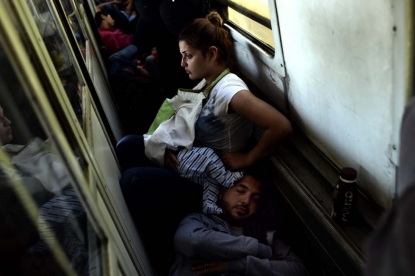 On a train from Macedonia to Serbia. August 30, 2015. (AFP / Aris Messinis)
On a train from Macedonia to Serbia. August 30, 2015. (AFP / Aris Messinis)Three euros left
Your father, Ahmad, was holding you in his arms as he handed the family's train tickets over. Your mother Alia carried your light blue blanket, a blue and red nap mat and a bag for your baby bottle, milk and nappies.
There was nowhere to sit, and barely any room to even squat on the dusty floor of the train corridor. They took turns holding you, played with you and fed you, doing their best to shield you and make you feel safe despite the unfriendly surroundings.
You didn't once cry during that train ride -- not that I can remember, at least -- while your parents opened up to me and my colleagues, photographer Aris Messinis and videographer Celine Jankowiak, sharing with us their hopes, dreams and fears.
They weren't quite sure where they were going yet, though you would end up joining relatives in the Netherlands.
They were nervous and frightened that the money they had on them wouldn't get you three to safety. In the end, by the time they reached the Netherlands, they had three euros left.
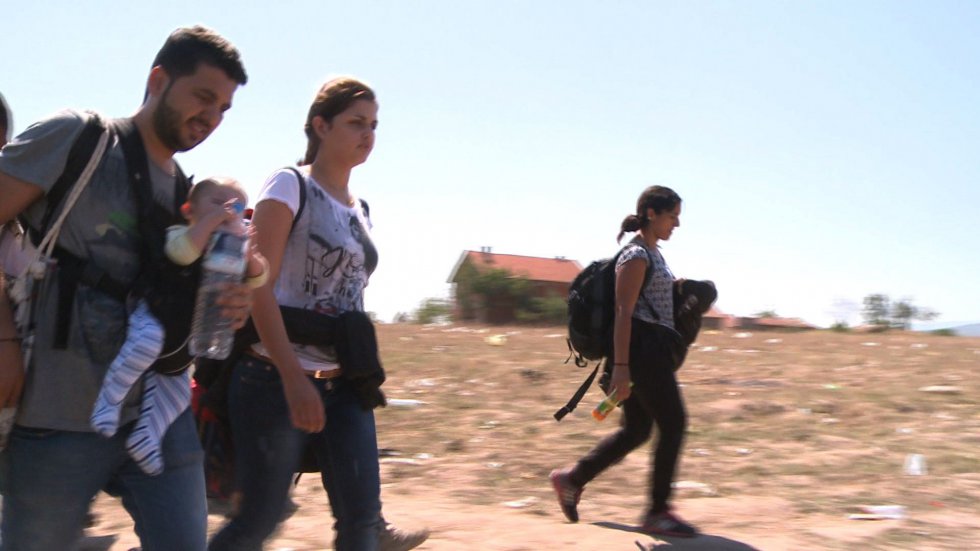
Click here to watch on a mobile device.
'Boat of death'
They also worried that the special baby milk you needed was fast running out.
As the train's rusty wheels creaked their way through Macedonia, Ahmad and Alia told us about how they had survived a bomb attack in Baghdad -- where you were born -- and about the sheer terror they had experienced on board the fishing boat you were smuggled in from Turkey to Greece.
They showed us pictures on Ahmad's mobile phone of their beautiful wedding in Turkey, and of Alia's badly scarred face in the aftermath of the bomb attack.
On the boat, they were terrified that they wouldn't make it to Greece. "The boat of death," they called it.
And after that first meeting, we followed your family's odyssey up to the Germany and then the Netherlands, crossing six countries in as many days.
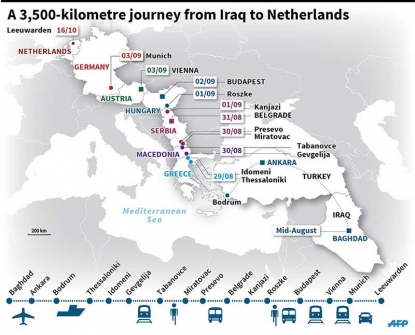 (AFP Graphics)
(AFP Graphics)Then in December, Celine and I visited you with photographer Emmanuel Dunand, to see how you were getting along.
Your parents and you were living in an exhibition centre that the Dutch authorities had converted into a temporary shelter for the hundreds of asylum seekers like you. Your family’s papers had finally been processed and now there was nothing left for your parents to do but wait and see whether they would be allowed to stay in the country they risked so much to reach.
You were seven months old by then, an outgoing, bubbly baby, and you'd learnt to say "Mama, Baba," delighting Ahmad and Alia who were thrilled to watch you grow.
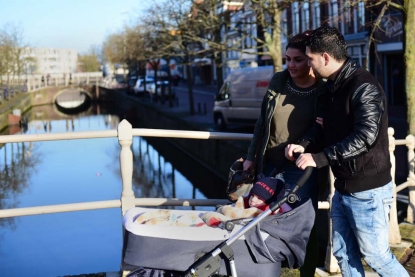 Crossing the canal in Leeuwarden. December, 2015. (AFP / Emmanuel Dunand)
Crossing the canal in Leeuwarden. December, 2015. (AFP / Emmanuel Dunand)We laughed when we realised that for such a young child, you had already travelled to more countries than many adults have in a lifetime.
Because you've had such an incredible start to life, I decided to write you this letter to start the New Year.
I'll ask your parents, who moved mountains to bring you to Europe, to keep it safe so you can read it when you're older.
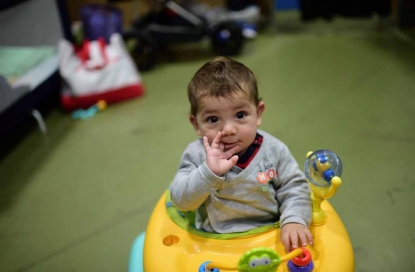 Baby Adam in his new life. (AFP / Emmanuel Dunand)
Baby Adam in his new life. (AFP / Emmanuel Dunand)'Bird in a cage'
However hard I try, I can't really imagine what life will be like for you and your parents in just a few years' time.
After arriving in the Netherlands, you and your parents were assigned to Leeuwarden, a small town in the north of the country, where the converted exhibition centre became your first home.
Your family was sharing a cubicle with two other Iraqi families, with no door and no ceiling.
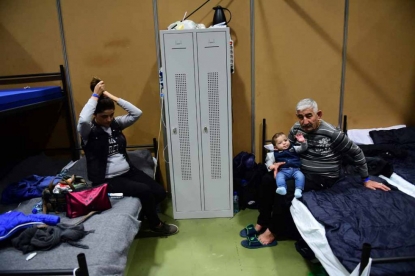 Sleeping quarters in the temporary shelter. (AFP / Emmanuel Dunand)
Sleeping quarters in the temporary shelter. (AFP / Emmanuel Dunand)You were the youngest resident of that centre -- there were 600 people there in all, mostly Syrians, Afghans and Iraqis.
Alia told us it was very hard for you to sleep at night because it was always noisy there. When the bright flourescent lights came on at 7:00 am, there was no chance of sleep at all.
Anxiety did not end for your parents once they reached the Netherlands. It took the authorities five weeks to register your family's asylum request, making your father feel like the country didn't want you, like it was telling you to leave.
When we visited you, your parents felt trapped in a labyrinth of sluggish, soulless administrative steps.
While the basics -- food, shelter -- were provided, your parents felt like they hadn’t started their new life yet, like they were stuck in some no man's land, between the nightmare of the past and the hope of the future.
"How can I explain it?" your Dad told me. "It's like a bird in a cage. It eats and drinks but it's not happy."
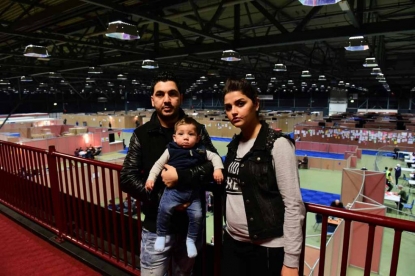 At the converted exhibition centre that is temporarily home. (AFP / Emmanuel Dunand)
At the converted exhibition centre that is temporarily home. (AFP / Emmanuel Dunand)Then came the deadly attacks in Paris, in which more than 130 people were killed in cafes, restaurants and a concert hall.
The Paris attackers were just as evil as the ones behind the 2014 bombing that pushed your parents out of Baghdad.
And yet after Paris, your parents felt the attitude change toward asylum seekers. People used to say hello to your Mum and Dad on the street. After those attacks, they stopped.
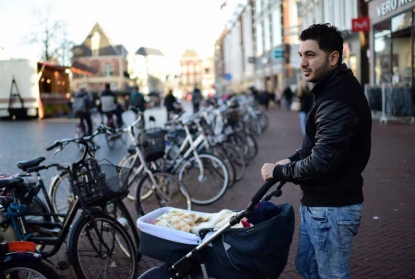 Ahmad surveys what he hopes will be his new home. (AFP / Emmanuel Dunand)
Ahmad surveys what he hopes will be his new home. (AFP / Emmanuel Dunand)As they wait to hear on their asylum request, your parents constantly worry that it could be rejected and they will be sent back to Iraq.
Despite their fear and anxiety, your parents try to remain positive. Your father has started learning Dutch with a group of other asylum seekers. Your mother goes with other women whom she has befriended to a "make-up room", where the women dress up and put on make-up to lift their spirits.
Once a week, you and your parents go to Mouni, a kebab restaurant in the heart of Leeuwarden that is popular among refugees. The food isn't quite the same as in Iraq, but it's a small taste of home.
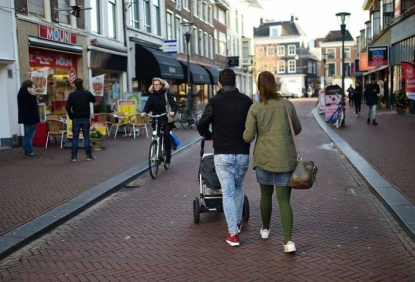 Ahmad and Alia head to their favourite kebab place. (AFP / Emmanuel Dunand)
Ahmad and Alia head to their favourite kebab place. (AFP / Emmanuel Dunand)It's hard to imagine what life will be like for your family in a few years' time, but having seen your parents' strength -- be it on the walk on the Balkan route or surviving the monotony of waiting for asylum papers -- I'm pretty sure that things will only get better from here on.
In just a few years, you'll be at school, speaking Dutch, likely Arabic, and possibly English too, making you a polyglot and a true citizen of the world.
In December, as we shared tea and coffee with your family at a terrace cafe in Leeuwarden, Alia's eyes lit up when she looked into the future, imagining the day when you would become a schoolboy in a safe country, far from Iraq's bombs and persecution.
Never lose hope
Things might be hard sometimes, for years to come.
The process of making a northern European country their home might not always be easy for your parents, especially as they arrived amid the continent's worst migration crisis since World War II.
The Netherlands is cold and wet, they grew up in a hot, dry country. They sold everything to get here and had to start from scratch.
What has kept them going so far is their love for you and for each other.
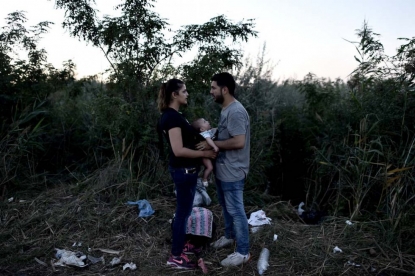 Crossing from Serbia to Hungary. September 1, 2015. (AFP / Aris Messinis)
Crossing from Serbia to Hungary. September 1, 2015. (AFP / Aris Messinis)And I'm pretty sure, despite a million obstacles and difficulties they will face on the long road to integration, that your family will make it.
Your parents have enough spirit and there are enough good people in the world to make that happen.
Oh, and just a last thought before I finish...
You mustn't think that just because you were a little baby at the time, you had no hand in getting your family to safety. You played a key role!
Like an angel, you fell asleep the night we followed a smuggler through a corn field on the Serbian-Hungarian border -- one of the toughest junctures of the journey.
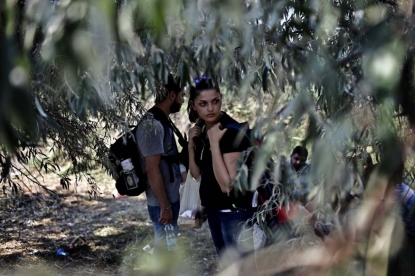 Crossing from Serbia to Hungary. September 1, 2015. (AFP / Aris Messinis)
Crossing from Serbia to Hungary. September 1, 2015. (AFP / Aris Messinis)You loved to smile and you were happy to play with other people on the over 2,000-km (1,200-mile) route who needed a little love to keep them going.
You made us all laugh, especially when you tried to eat Celine's bright blue AFP microphone foam during interviews.
Your life has been an adventure from very early on, so I'm sure that whatever your future holds, you'll have it in you to make it through.
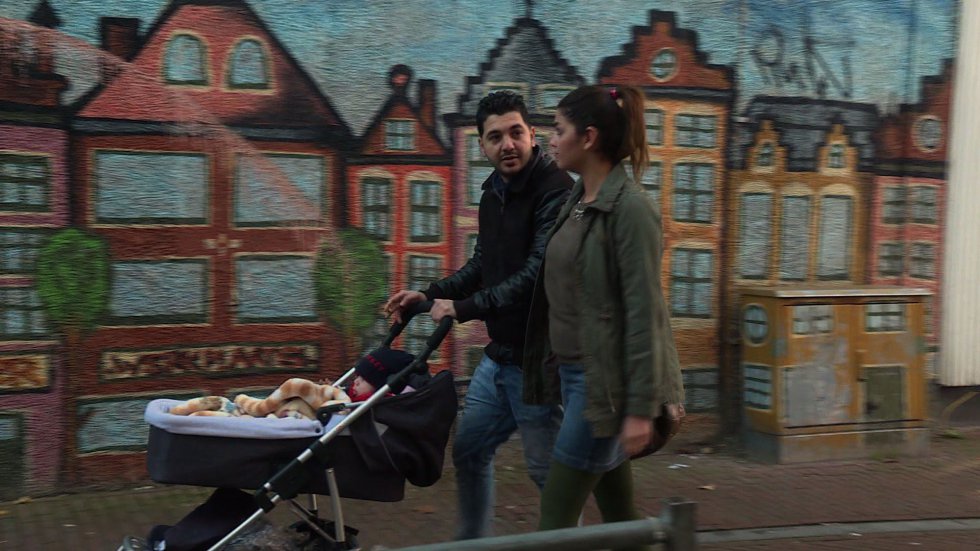
Click here on watch on mobile device
A case in point -- a few days after I returned to Paris after visiting you in the Netherlands, your father texted me saying you had been assigned a new place to live -- this time a single room in another shelter.
It wasn't perfect, he said, but it was better. That became the sixth place you had lived in since your arrival in the Netherlands -- imagine that!
And if things ever do get tough, remember what your father told us in Leeuwarden: Never lose hope. "If one loses hope in life, there can be no more life," he said.
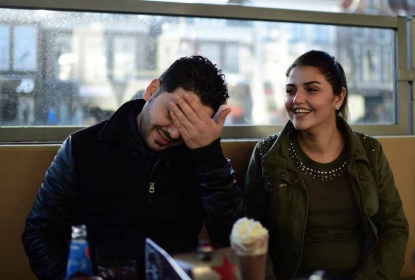 Laughing in the face of it all. (AFP / Emmanuel Dunand)
Laughing in the face of it all. (AFP / Emmanuel Dunand)I wish you three survivors a wonderful life ahead. No one I know deserves it more.
With love,
Serene
Serene Assir is an AFP correspondent based in Paris. Follow her on Twitter.
This blog was edited by Yana Dlugy in Paris.
This is the latest of a series of blogs Serene has written on the migrant crisis. Read Part 1 and Part 2 on following the asylum seekers on the Balkan migrant route. Click here to read her blog on those arriving in Greece.
Click on a photo to start a slideshow on the family's journey to The Netherlands:















